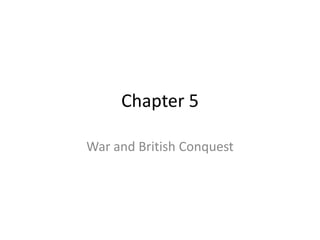
Chapter 5 notes
- 1. Chapter 5 War and British Conquest
- 2. The British Conquest of North America • Fighting broke out between Britain and France to control the Ohio Valley in 1754 – This was along the western boundary of the Thirteen Colonies • This dispute turned into a fight for the whole continent • By 1756 the fight had gone global and nine European countries had chosen sides • In 1760 Britain seized control of Quebec • Britain also took control of the French colony of Guadeloupe in the Caribbean
- 3. Treaty of Paris • The war ended in 1763 with the signing of the Treaty of Paris • The treaty allowed France to keep the colony of Guadeloupe and a small base in North America – The islands of Saint-Pierre and Miquelon • In the treaty they also gave up its other claims in North America to Britain and Spain
- 4. History Happens • Read “It Only Lasted an Hour” on page 156 • Read “The Battle of the Plains of Abraham” on page 157. – Answer questions 1 and 2
- 5. Britain’s Victory: Change and Challenge • The Treaty of Paris was signed in order to end the Seven Year War • France had to give up almost all of its claims to North America under the Treaty of Paris • In the negotiations for the Treaty of Paris, France made Britain guarantee that they wouldn’t retaliate against any of the French allies • They also made sure that the people of New France would still be able to practice their religion
- 6. The Visit from Pontiac • Pontiac was the leader of the Odawa • The Odawa were part of the Anishinabe nation and were a long time ally of the French • He spread word from village to village trying to get people of the First nations to join together and fight the British. • His reasoning was to try to maintain their claim to the land which they believed was left to them by their ancestors.
- 7. The Last Governor of New France • The last governor of New France was Pierre de Rigaud de Vaudreuil de Cavagnial • He was forced to give up New France in the negotiations in the Treaty of Paris • He was the one who surrendered to the British in 1760 • He surrendered because he felt France couldn’t win, and that the population had already suffered enough • Vaudreuil was arrested for surrendering and spent several weeks in prison • France withdrew from New France, but the Canadiens remained because that was their home
- 8. The Royal Proclamation of 1763 • This was Britain’s attempt to create everlasting peace • A proclamation is a statement of law and policy • They set this proclamation a few months after Pontiac began to organize the First Nation’s resistance
- 9. Proclamation’s Aim to Assimilate the Canadiens • Establish the Province of Quebec – The province would have a British style government with a governor and appointed council • They also promised an elected assembly, but Britain didn’t come through with this promise for almost thirty years • They disallowed Catholics from holding positions in government • Abolished French civil law (the relationship between seigneurs and habitants, and the tithes (taxes that supported the Catholic church) • Encouraged settlers from the Thirteen Colonies to move to Quebec – They did this by disallowing free movement west
- 10. Proclamation’s Aim to Make Peace with the First Nation • Started by setting a proclamation line that separated the Thirteen Colonies from “Indian Territory” • They would not allow settlements in the “Indian Territory” until the First Nations came to an agreement about these lands with Britain
- 11. The Quebec Act of 1774 • By 1776 the Thirteen Colonies were at war with Britain, trying to become an independent country – This was the American War of Independence • This brought issues of identity into focus, just like it did with the Acadians • Unlike during the Seven Year War, the British looked at the French Canadiens in a different light – They no longer saw them as enemies, but as potential allies
- 12. • The Royal Proclamation of 1763 made it clear that Britain expected the Canadiens to assimilate – They hoped the Canadiens would choose to become British on their own • However, the Canadiens did not give up their language, custom, or religion
- 13. • The Canadiens had little in common with the British rulers • They were not allowed to participate in government because they were Catholic, and Britain still had not set up the elected assembly they promised in the Royal Proclamation of 1763
- 14. • By 1774, the population in Quebec was larger than 70,000 people • Not many British people lived in this colony
- 15. • Britain decided to return some of the French Canadiens rights that the Royal Proclamation of 1763 had taken away • They did this by passing the Quebec Act of 1774 • The act ensured that French language and Canadien culture were maintained.
- 16. What the Act Ensured • Allowed Catholic people in Quebec to practice their religion • Allowed Canadiens to hold government positions, only after they swore the Oath of Allegiance to Britain • Reinstated the French Civil Law that the Royal Proclamation of 1763 had taken away • Extended the boundaries of Quebec beyond the proclamation line – Britain changed these boundaries without consulting the First Nations people, even though the Royal Proclamation of 1763 required consultation